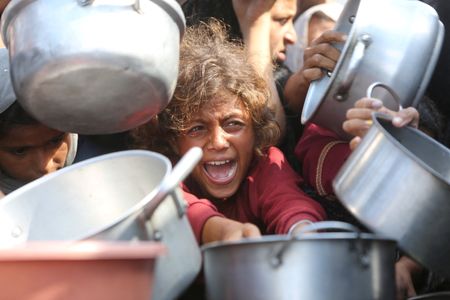By Kate Abnett
BRUSSELS (Reuters) -The European Commission will next month propose legal measures to phase out the EU’s imports of all Russian gas and liquefied natural gas by the end of 2027, it said on Tuesday.
Here are the key details:
GAS AND LNG
Russia was Europe’s top gas supplier before its 2022 full-scale invasion of Ukraine, providing around 45% of the European Union’s gas. That share plunged to 19% last year, and the EU has vowed to eliminate it altogether in response to the war.
The European Commission will in June present legal proposals to ban new Russian gas and liquefied natural gas (LNG) deals, and ban EU imports under existing spot contracts by the end of 2025, it said in plans published on Tuesday.
The Commission will also propose next month to ban imports under existing long-term contracts by the end of 2027. Companies including TotalEnergies and Spain’s Naturgy have Russian LNG contracts that extend into the 2030s.
The EU plans would affect countries including Hungary and Slovakia, which still receive Russian gas via pipelines, and countries including Belgium, France, the Netherlands and Spain, which buy Russian LNG.
Others, including Poland and the Baltic states, already stopped buying Russian gas.
To attempt to better track imports from Russia, the Commission will also propose rules obliging companies to disclose the volumes and duration of their Russian gas contracts.
OIL
Unlike with gas, the EU has imposed sanctions on most Russian oil imports, with exceptions for Slovakia and Hungary. Those countries, which have sought to maintain close political ties to Russia, have threatened to block gas sanctions, which they say would drive up energy prices.
The EU will propose requirements for Slovakia and Hungary to produce national plans for how they will quit Russian oil by end-2027. The two countries still import more than 80% of their oil from Russia.
Just 3% of total EU oil imports now come from Russia, compared with around 27% before the Ukraine war.
Member countries will also be required to present national plans for phasing out Russian gas by end-2027, the Commission said.
NUCLEAR FUEL
The European Commission will in June propose trade measures targeting Russian enriched uranium. EU energy commissioner Dan Jorgensen said this would amount to a tax or levy on imports.
The Commission did not specify any phase-out date for Russian uranium imports.
Five EU countries – Bulgaria, the Czech Republic, Finland, Hungary and Slovakia – have Russian-designed reactors set up to run on Russian fuel. While all except for Hungary have signed contracts for alternative supplies since 2022, years-long wait times mean they are not able to immediately switch.
WHAT HAPPENS NEXT?
The European Commission’s legal proposals, due in June, will require approval from the European Parliament and a qualified majority of member states – meaning one or two countries cannot block the plans.
EU countries and lawmakers will need to fast-track these negotiations, if the ban on new Russian gas deals is to apply by the end of the year.
The effectiveness of the EU measures will depend on the legal options used, which the Commission did not specify on Tuesday. Jorgensen said the proposals would amount to “force majeure” – an unforeseeable event that companies could use as grounds to exit gas contracts.
Lawyers have warned, however, that in the absence of sanctions, it will be difficult for buyers to exit gas contracts using force majeure, without facing financial penalties or arbitration.
The EU imported 32 billion cubic metres (bcm) of Russian gas via pipeline and 20 bcm of Russian LNG last year. Two-thirds was under long-term contracts, and the rest uncontracted “spot” purchases.
(Reporting by Kate AbnettEditing by Tomasz Janowski)











